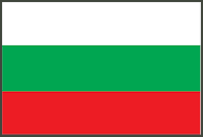Bulgaria
 Bulgaria is the European Union's poorest country. Bulgaria has been plagued by instability in recent years, with sluggish economic growth, a loss of investment, persistent deflation and rising unemployment.
Bulgaria is the European Union's poorest country. Bulgaria has been plagued by instability in recent years, with sluggish economic growth, a loss of investment, persistent deflation and rising unemployment.
Bulgaria joined the European Union in 2007 but still remains outside the eurozone and the passport-free travel Schengen area. Bulgaria's population of 7.4 million people has the lowest living standards across the 27-member bloc. Membership for Bulgaria and Romania in the visa-free Schengen zone has been postponed under the threat of a German veto. Berlin has expressed concerns about the strength of the rule of law in the two EU member states.
Bulgaria shares a border with Turkey and Greece to the south, Macedonia and Serbia to the west, Romania to the north, and the Black Sea to the east. The capital, Sofia, lies in the western region of the country. Ethnic groups include Bulgarian, Turkish, Roma, and others. The official language is Bulgarian.
The Bulgarian army enjoys higher trust than any other institution ever since the change after 1989. The Bulgarian Army represents the Armed Forces of the Republic of Bulgaria. Operational elements of the Bulgarian Army include: Bulgarian Land Forces (army), Bulgarian Navy (navy), and the Bulgarian Air Forces (air force). The term ‘Armed Forces’, under the Law on Defense and the Armed Forces (Art. 50(1)), includes the “Bulgarian Army” plus the Military Police Service, the Military Information Service, the military education institutions, the Military Medical Academy, the Ceremonial Guard Unit, the Military History Museum and the Reserve. The MoD military personnel is also part of the Armed Forces under the Law. Under the same law (Art. 60a(2)) the term ‘Bulgarian Army’ includes the Joint Operations Command, the three Services as well as training, maintenance and logistics formations.
Bulgaria became a member of NATO on March 29, 2004. Bulgaria's military is currently undergoing an ambitious restructuring program which aims to bring the army up to NATO standards, modernize equipment, and bring about full integration of the civilian and armed components. In 2008, Bulgaria made the transition to an all-volunteer force. Through FY 2010, the US Government had provided approximately $143 million in foreign military financing assistance to support training and procurement of military equipment.
Bulgaria had over 700 troops serving abroad in support of NATO, EU, and UN missions as of 2010. It currently has around 600 troops in Afghanistan and has maintained small contingents in Bosnia and Herzegovina and Kosovo. It has several military observers serving in support of United Nations missions in Liberia and Kosovo, as well as the EU's Operation Atalanta to fight piracy off the coast of Somalia. Bulgaria deployed a frigate to help enforce the UN arms embargo against Libya in 2011.
There are three Bulgarian bases identified as “joint-use facilities” (meaning the U.S. has the right to station troops and conduct training in them) in the U.S.-Bulgarian Defense Cooperation Agreement (DCA) signed April 28, 2006 by Secretary of State Condoleezza Rice: Novo Selo Training Area (including the Aytos Storage Facility), Bezmer Air Base, and Graf Ignatievo Air Base.
By achieving membership in both the North Atlantic Treaty Organization (NATO) and the European Union (EU), post-communist Bulgaria achieved two major political objectives as well as accomplished long sought - after strategic goals. These memberships placed new demands and requirements upon the development of the Bulgarian Armed Forces. Bulgarian accession into these organizations came as a consequence of the efforts made by both the government and its people. It emblemized everything that Bulgarians stand for.
Bulgaria is a comparatively small European country in the eastern part of the Balkan peninsula with a population of 7.1 million inhabitants in 2016. The country is a parliamentary representative democratic republic with a multiparty system and free elections. Bulgaria has been undergoing a dramatic demographic crisis fuelled by negative population growth and negative net international migration, leading to a steady and continuous population decline and steep drop of the working-age population. In parallel, the country has undergone a profound transformation from a centrally planned to an open market economy. The whole process has been protracted and uneven, marked by recessions and booms.
Regardless of the comparatively stronger economic performance in 2015–2016, Bulgaria is still facing serious economic and social challenges, with worryingly high levels of poverty and significant regional variances in all related indicators. The lack of political stability (as indicated by the frequent changes in government in the period 2013–2017) has greatly undermined reform efforts in a number of fields, including health care.
The weakening of the EU gravitational pull left a power vacuum in South-east Europe that was readily filled in by authoritarian powers such as Russia. The Kremlin took advantage of the democratic backsliding and the widespread state capture among dysfunctional institutions to enhance its economic and political influence in the region. Bulgaria withdraws from the EU far more funds than what it pays to the EU budget, which implies that it lives on the account of tax payers of developed EU members. Never the less, the Bulgarians still have stronger emotional connections towards Russia than the EU, including Germany.
|
NEWSLETTER
|
| Join the GlobalSecurity.org mailing list |
|
|
|

